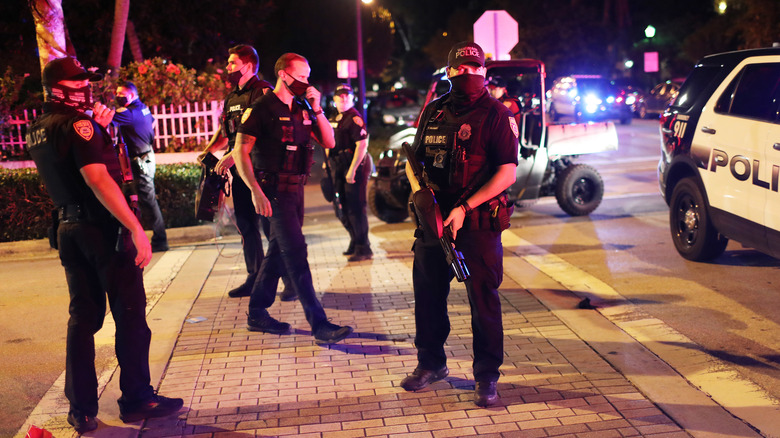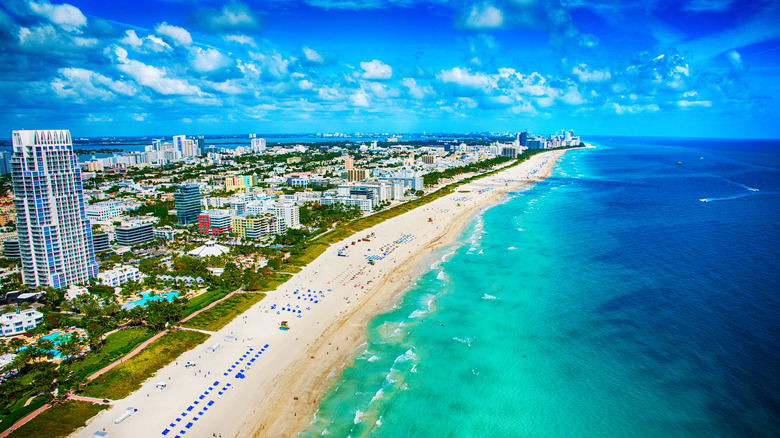Breaking up is hard to do, but when the relationship grows toxic, it must be done. That’s the stance the City of Miami Beach has taken in a recent video PSA, but the destination isn’t breaking up with a person — it’s splitting from its spring break image.
With the text, “Hey Spring Break, we’re over,” the message is clear: spring break partiers aren’t welcome in the city this year. As the actors in the clip explain, Miami Beach locals are all for relaxing and having fun, but their idea of a good time involves trying a new restaurant or sunbathing on the beach — not “getting drunk in public and breaking laws.”
The video references the spring break mayhem that occurred in 2023, when the resort town experienced two fatal shootings along with 488 arrests, nearly half of which were for felony offenses. To avoid similar chaos in 2024, Miami Beach will impose curfews, bag checks, beach access restrictions, DUI checkpoints, and $100 parking (no, that’s not a typo) throughout the month of March.
Miami Beach has suffered a string of crime-filled spring breaks

Miami Beach is already known as one of the most dangerous beaches in Florida, and spring break only seems to amplify the city’s crime and disorder. The coastal getaway has struggled to contain spring break crowds and put a stop to street crime three years in a row. In 2022, two shootings injured five people, and in 2021, more than 1,000 arrests were made during the spring break season. Guns have also been an issue that law enforcement has struggled to tackle effectively — more than 100 firearms were confiscated during last year’s spring break alone.
Previously, Miami Beach responded to violence and out-of-control mobs by issuing emergency curfews to get people off the streets. This year, the planned curfews and other restrictions are meant to get ahead of the chaos before it begins. According to the Associated Press, Governor Ron DeSantis announced during a news conference, “Florida is a very welcoming state. We welcome people to come and have a good time. What we don’t welcome is criminal activity. What we don’t welcome is mayhem and people who want to wreak havoc on our communities.”
Spring break fun can be found just outside of Miami Beach

Even if you have no plans of toting weapons or getting into fights (and we hope you don’t) during your spring break vacation, you may want to reconsider a trip to Miami Beach to avoid this year’s hefty parking fees and other restrictive measures. Fort Lauderdale is one overlooked Florida beach town that’s a convenient alternative. The city is just 30 miles north of Miami Beach and offers similar coastal views and access to incredible beaches. And unlike its rowdy neighbor, the City of Fort Lauderdale is welcoming spring breakers with a campaign centered around “organized fun.” Through March, Fort Lauderdale will prohibit alcohol, coolers, loud music, scooters, and tents in some areas to maintain a peaceful environment for a variety of visitors. Additionally, there will be more police patrolling busy areas. To boost safety and keep drunk driving to a minimum, the Florida city will also provide free or low-cost rides and community shuttles.
If your spring vacation lands in the second half of the month, you might also want to consider swapping Miami Beach for Miami — yep, they’re two different places (though located just next to one another). Besides visiting all of Miami’s hottest tourist attractions, you can partake in this year’s Miami Music Week from March 19 to 24. Clubs and other hotspots will host music-themed events, followed by Ultra Music Festival over the weekend.

